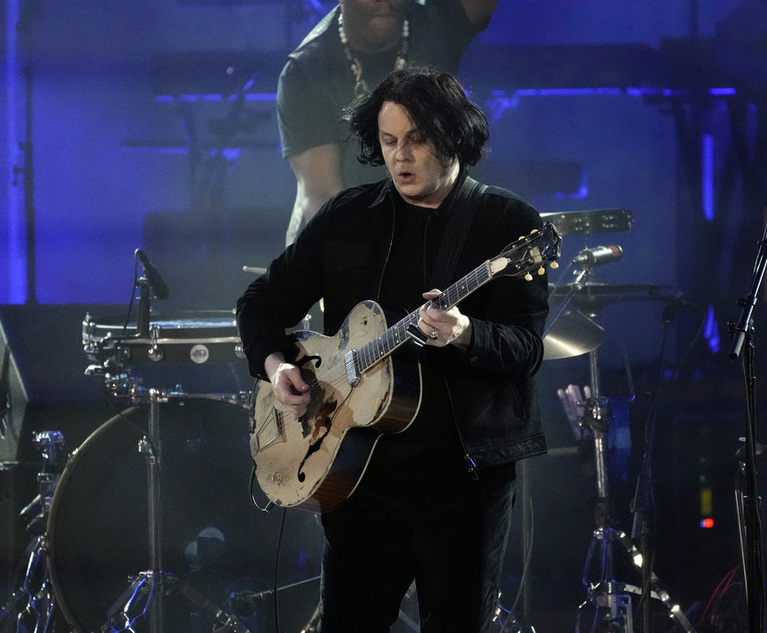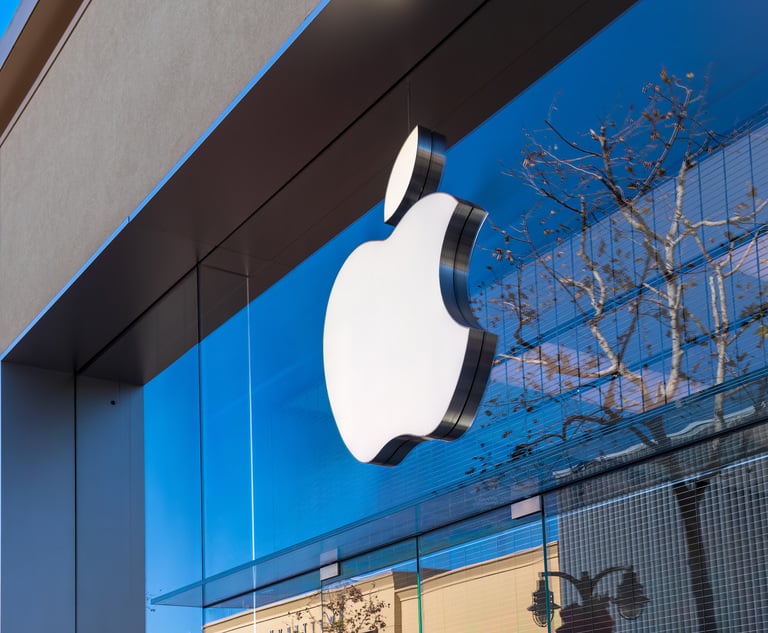 Jack White of the White Stripes performs on stage. Photo: Carlos Osorio/AP
Jack White of the White Stripes performs on stage. Photo: Carlos Osorio/APThe White Stripes Drop Copyright Claim Against Trump Campaign
The case was one of the high-profile claims filed against Trump for alleged misuse of songs during his campaigns. A suit filed in Georgia by the estate of Isaac Hayes remains pending. In September, Trump lost a four-year-old suit challenging his use of Eddy Grant’s song “Electric Avenue.”
November 12, 2024 at 07:46 PM
3 minute read
What You Need to Know
- The White Stripes objected to use of “Seven Nation Army” in a video featuring Trump.
- The suit in New York’s Southern District was dismissed voluntarily.
- A separate case filed in Georgia over use of “Hold On, I’m Coming” is pending.
Jack White and Meg White of the Grammy-winning duo The White Stripes have voluntarily dropped their copyright claim against President-elect Donald Trump and his presidential campaign over alleged misuse of one of their most popular songs.
In a filing recorded Sunday in the U.S. District Court for the Southern District of New York, plaintiffs attorney Robert A. Jacobs said the artists dismissed without prejudice all claims against the defendants.
Jacobs, a partner with Manatt, Phelps & Phillips, declined to comment in a statement emailed to The Recorder. A message left for Jack White’s representative at Monotone Management in Los Angeles was not immediately returned.
The complaint, filed in September, alleged the defendants willfully misappropriated the song "Seven Nation Army" in a video posted in late August to social media platforms. The video played the song’s signature bass riff while showing Trump boarding an aircraft on his way to campaign events, according to the complaint.
The seven-note riff, it said, "is one of the most memorable and widely recognized pieces of modern-day music." The song was released as part of the White Stripes' 2003 album "Elephant," which won a Grammy for Best Alternative Music Album.
The suit said the defendants were aware they were not authorized to use the copyrighted song because the plaintiffs had denounced its use by Trump and his campaign during his 2016 presidential run, "stating in no uncertain terms that they were 'disgusted by that association.'"
A message sent to a Trump campaign representative Tuesday was not immediately answered.
The suit was one of two high-profile music copyright suits filed against Trump during his recent election campaign. In Georgia, the estate of musician Isaac Hayes sued Trump for allegedly misusing the song “Hold On, I’m Coming” at campaign events. The case remained pending Tuesday in the U.S. District Court for the Northern District of Georgia. Attorney James L. Walker, who represents the plaintiff, did not immediately respond to a request for comment.
While many artists publicly objected to use of their songs by political campaigns during the run-up to the Nov. 5 election, such use is often authorized through blanket licenses purchased through performing rights organizations such as BMI (Broadcast Music Inc.) or the American Society of Composers, Authors and Publishers, known as ASCAP. If a rights-holder objects to use of their song, the issue commonly is resolved through a request to remove the title from the license.
In September, musician Eddy Grant prevailed in his four-year-old suit against Trump for use of the 1983 song “Electric Avenue” in a political video shared on Trump’s Twitter account during his 2020 campaign.
The opinion by U.S. District Judge John Koeltl of the Southern District of New York supported the plaintiffs’ position that “widespread, uncompensated use of Grant’s music in promotional videos—political or otherwise—would embolden would-be infringers and undermine Grant’s ability to obtain compensation in exchange for licensing his music.”
Koeltl rejected the defense’s argument that the video was allowable under “fair use” and denied that blocking use of the song would “chill legitimate political satire.”
According to an extension request filed on Oct. 10 by the plaintiffs’ counsel, Brett Van Benthysen of Reitler Kailas & Rosenblatt, a settlement conference was scheduled for Nov. 20 before U.S. Magistrate Judge Henry J. Ricardo.
NOT FOR REPRINT
© 2025 ALM Global, LLC, All Rights Reserved. Request academic re-use from www.copyright.com. All other uses, submit a request to [email protected]. For more information visit Asset & Logo Licensing.
You Might Like
View All

Music App Denied Injunction Against Apple Over Alleged Scheme to Block Its Access to App Store

Anthropic Agrees to 'Guardrails' for Its AI Training to Protect Copyrighted Lyrics Pending Fight Over Fair Use
5 minute read
Counterfeiters Ride Surge in Tabletop Games’ Popularity, Challenging IP Owners to Keep Up
8 minute readTrending Stories
Who Got The Work
J. Brugh Lower of Gibbons has entered an appearance for industrial equipment supplier Devco Corporation in a pending trademark infringement lawsuit. The suit, accusing the defendant of selling knock-off Graco products, was filed Dec. 18 in New Jersey District Court by Rivkin Radler on behalf of Graco Inc. and Graco Minnesota. The case, assigned to U.S. District Judge Zahid N. Quraishi, is 3:24-cv-11294, Graco Inc. et al v. Devco Corporation.
Who Got The Work
Rebecca Maller-Stein and Kent A. Yalowitz of Arnold & Porter Kaye Scholer have entered their appearances for Hanaco Venture Capital and its executives, Lior Prosor and David Frankel, in a pending securities lawsuit. The action, filed on Dec. 24 in New York Southern District Court by Zell, Aron & Co. on behalf of Goldeneye Advisors, accuses the defendants of negligently and fraudulently managing the plaintiff's $1 million investment. The case, assigned to U.S. District Judge Vernon S. Broderick, is 1:24-cv-09918, Goldeneye Advisors, LLC v. Hanaco Venture Capital, Ltd. et al.
Who Got The Work
Attorneys from A&O Shearman has stepped in as defense counsel for Toronto-Dominion Bank and other defendants in a pending securities class action. The suit, filed Dec. 11 in New York Southern District Court by Bleichmar Fonti & Auld, accuses the defendants of concealing the bank's 'pervasive' deficiencies in regards to its compliance with the Bank Secrecy Act and the quality of its anti-money laundering controls. The case, assigned to U.S. District Judge Arun Subramanian, is 1:24-cv-09445, Gonzalez v. The Toronto-Dominion Bank et al.
Who Got The Work
Crown Castle International, a Pennsylvania company providing shared communications infrastructure, has turned to Luke D. Wolf of Gordon Rees Scully Mansukhani to fend off a pending breach-of-contract lawsuit. The court action, filed Nov. 25 in Michigan Eastern District Court by Hooper Hathaway PC on behalf of The Town Residences LLC, accuses Crown Castle of failing to transfer approximately $30,000 in utility payments from T-Mobile in breach of a roof-top lease and assignment agreement. The case, assigned to U.S. District Judge Susan K. Declercq, is 2:24-cv-13131, The Town Residences LLC v. T-Mobile US, Inc. et al.
Who Got The Work
Wilfred P. Coronato and Daniel M. Schwartz of McCarter & English have stepped in as defense counsel to Electrolux Home Products Inc. in a pending product liability lawsuit. The court action, filed Nov. 26 in New York Eastern District Court by Poulos Lopiccolo PC and Nagel Rice LLP on behalf of David Stern, alleges that the defendant's refrigerators’ drawers and shelving repeatedly break and fall apart within months after purchase. The case, assigned to U.S. District Judge Joan M. Azrack, is 2:24-cv-08204, Stern v. Electrolux Home Products, Inc.
Featured Firms
Law Offices of Gary Martin Hays & Associates, P.C.
(470) 294-1674
Law Offices of Mark E. Salomone
(857) 444-6468
Smith & Hassler
(713) 739-1250






